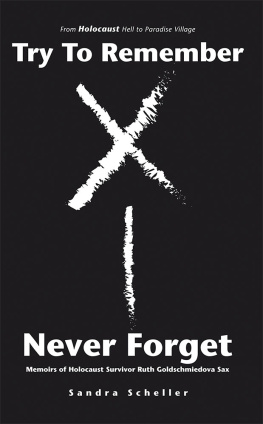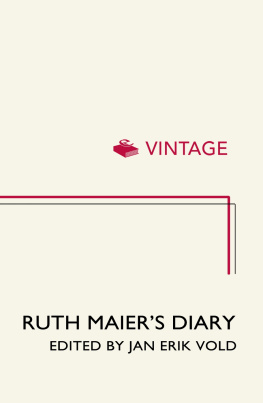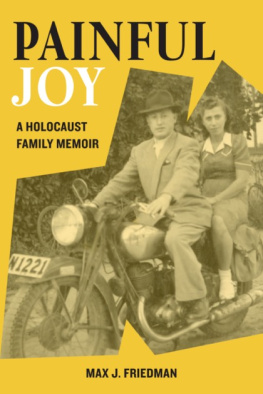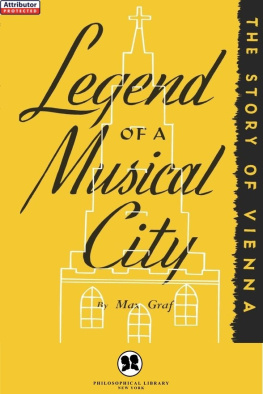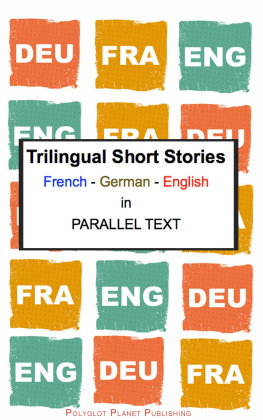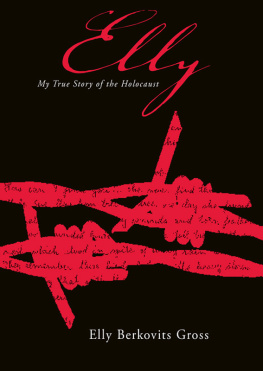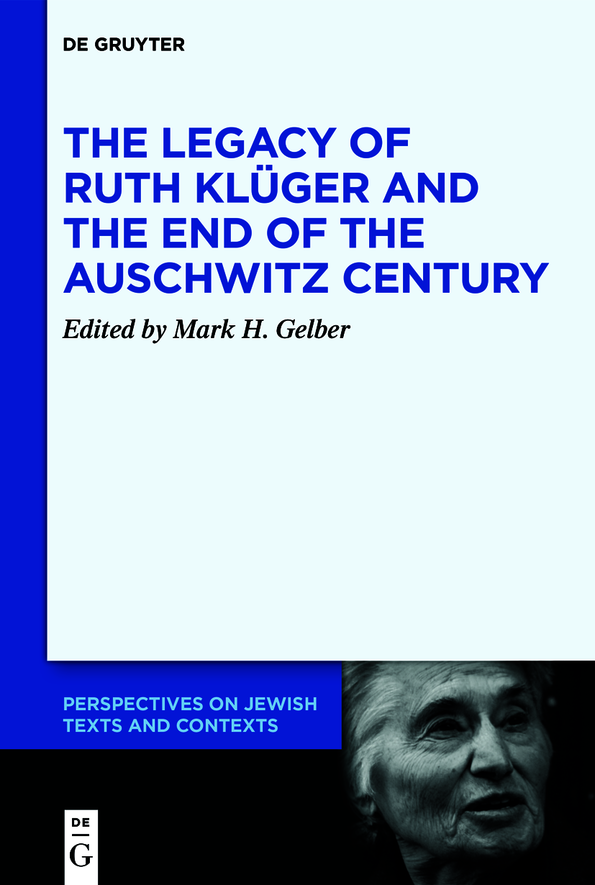Perspectives on Jewish Texts and Contexts
Edited by
Vivian Liska
Robert Alter
Steven A. Aschheim
Leora Batnitzky
Richard I. Cohen
Mark H. Gelber
Moshe Halbertal
Christine Hayes
Moshe Idel
Moyn Samuel
Ilana Pardes
Alvin Rosenfeld
David Ruderman
Bernd Witte
Volume
ISBN 9783110629699
e-ISBN (PDF) 9783110793239
e-ISBN (EPUB) 9783110793277
Bibliographic information published by the Deutsche Nationalbibliothek
The Deutsche Nationalbibliothek lists this publication in the Deutsche Nationalbibliografie; detailed bibliographic data are available on the Internet at http://dnb.dnb.de.
2022 Walter de Gruyter GmbH, Berlin/Boston
Introduction The Legacy of Ruth Klger and the End of the Auschwitz Century
Mark H. Gelber
When Ruth Klger passed away in October 2020, I thought it would be very fitting and important to organize an international conference in honor of her legacy. Given the worldwide pandemic which raged at that time, it appeared to me to be prudent to set the date for this meeting well in advance, in fact in a years time, which would have also marked her yahrzeit, the annual Jewish commemoration of the day of death, as well as her 90th birthday. Ruth Klger was not one for whom birthdays meant all that much; I think she would have preferred to forget her own birthday every time it came around. Perhaps each birthday appeared to her to be one of several harbingers of her eventual death, a reminder that she had one year less to live. Still, she had been very much determined to come to terms personally with the Jewish concept of yahrzeit and how to mark it fittingly, first and foremost, in the case of her father. She addressed this issue in her writing and in her poetry. Consequently, I decided to entitle the conference tentatively: Kaddish for Ruth Klger and the End of the Auschwitz Century, and I began to organize the event. Some colleagues and friends of hers responded positively to this concept, which on one hand aimed to focus on her literary and scholarly legacy, while on the other hand it purported to invite a discussion beyond the person and career of Ruth Klger on the basis of her contribution to specific areas of concern related to understanding the Shoah and the end of the Auschwitz century.
As far as I have been able to determine, the term Auschwitz century was coined by one of the contributors to this volume, Irne Heidelberger-Leonard, Professor Emerita of the Universit Libre de Bruxelles, who was a close friend of Ruth Klger and who is presently writing her biography. What Heidelberger-Leonard means by this particular formulation is that the century or the period of time which began with the Nazi genocide formally comes to an end when the last of the survivors finally dies. It is a term that has not been widely accepted as yet. Still, one must ask what is at stake when there are no victims of Nazi atrocities alive to testify regarding the horrible crimes committed during the Shoah and concerning their own experiences of survival and suffering? Would the claims of deniers of the Shoah somehow become more cogent or believable after the end of the Auschwitz century?
These questions bring to mind some of the talks and responses given at an international conference, entitled Belated or Timely Memories: the Last Phase of Survivor Literature, which I organized at Ben-Gurion University in Beer Sheva in May, 1996. Ruth Klger was one of the principal speakers and active participants at this meeting. Others who lectured at this meeting included Geoffrey Hartman, Freddie Rokem, Sara Horowitz, Shlomo Breznitz, Henry Greenspan, Vivian Liska, Alan Rosen, Fanya Gottesfeld Heller, myself, and others. Cordelia Edvardson, Alvin Rosenfeld, Sigrid Bauschinger, Jakob Hessing, Shimon Redlich, Efraim Sicher, Norman Simms, to name just a few of the better known attendees, also participated actively. My motivation for organizing this conference had to do with my sense that a new phase of Shoah-related literature had commenced already by the early 1990s with the appearance of several autobiographical accounts, written by survivors of the Shoah, who had survived the camps or in hiding as children. At that time, more than fifty years had elapsed since the liberation of the concentration camps and the end of the war. Some of the youngest survivors who were still alive, like Ruth Klger, were beginning finally to write about their experiences as child survivors, despite the gap in time and the challenge of remembering or reconstructing the past, especially given the traumatic events and ordeals that characterized their survival and the dislocations and disorientations many of them suffered during their subsequent lives following the Shoah. Complicating issues concerning the form and content of this literature included: relocation, coming to terms somehow with the death of immediate family members, the search for lost family members who were possibly alive, readjusting or creating new family or support structures, negotiating new human relationships, processes of finding paths to a more or less normal existence often in a different or new culture and language, which may have included education or reeducation and finding means of employment.
However, the opening lecture at this conference, entitled The Dilemma of the Child Survivor, given by Rabbi Joseph A. Polak, who at that time served as a Justice of the Rabbinical Court of Massachusetts and as director of the Hillel House at Boston University, probably confounded most of the conference attendees. At the very least, it astounded me, but it also helped me to revise partially my original conception of what this conference might accomplish. Polak, born in 1942, was an infant and then a toddler who together with his mother survived the Westerbork transit camp and the Bergen-Belsen concentration camp. In Beer Sheva, he stated that although he certainly was to be classified as a survivor, as this term is commonly understood in connection with the Shoah, he had no specific personal memories of the experience or of hardships or of survival per se. His father and thirty members of his family were murdered during the tragic ordeal. Polak reported that in 1945 during the final days of the war, he and his mother and other inmates of Bergen-Belsen were loaded onto a transport train which departed from the camp heading towards an unspecified destination. But, at some point during the journey the train just stopped in the middle of nowhere, and the personnel in charge of the train abandoned it and took flight. He first wrote about this experience in a short piece entitled The Lost Transport (published in Commentary in 1995).
In the meantime, Rabbi Polak has written in detail and elaborated on his particular case in a book entitled After the Holocaust the Bells Still Ring (2015). Because he had no specific memories about his experiences as a child survivor, owing to his tender age at the time, he had to piece together belatedly the puzzle of his survival from the bits and pieces of what he had been told, together with information he subsequently collected from his reading and research.
The case of Rabbi Polak appears to call into question some of the standard categories and terminology used to discuss the phenomenon of Holocaust survival. While the conference in Beer Sheva attempted to analyze and focus on the last phase of survivor literature, which I claimed had already come into existence by the early 1990s, I could have never guessed that this last phase would last for decades. Now, some thirty years later, the end of the Auschwitz century is being bruited, although when the real end of the Auschwitz century in the sense that Irne Heidelberger-Leonard has proposed will truly come to pass, is uncertain and perhaps ultimately indeterminate.




